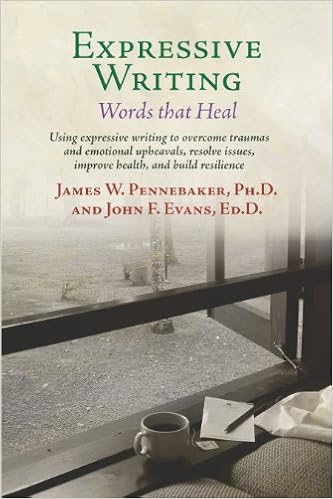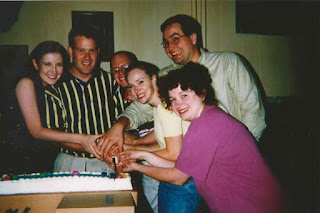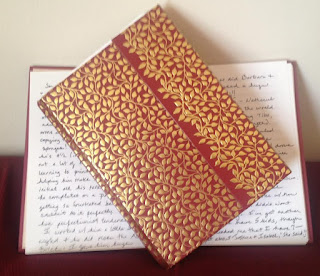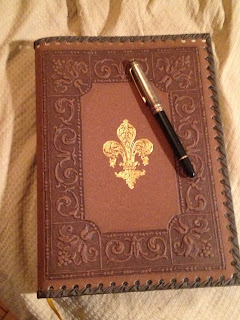Recently I received a question, a couple actually, from my friend
Marty about journaling. I admit I was honored that he would reach out to me for
advice. I thought his question would make for an excellent blog post so I am
reprinting what he wrote, with his permission. His questions, a follow-up email
message, and my responses will comprise a two-part post.
Marty's questions: Every now and then I get the urge to
journal. I may keep it up for a few days, but I always fall out of the habit.
Most of the time my journal ends up being very humdrum "here's what I did
today" with occasional bouts of philosophizing, but not much of that. My
question is, do you go back and read through your old entries? Obviously you must
because you wrote a book based on that concept. My trouble is that when I go
back and read what I wrote years earlier, I can't stand the sound of my own
"voice." More depressingly, I don't feel like I've changed at all. I
know I have, but it's sad because I want to think I more mature, more
enlightened. All of that is probably a subconscious reason I don't journal with
any consistency. I think I journaled the entire first year of Ryan's [his son] life
though. That might be a good one to go back and read. I'm not sure what I am
asking you, but I guess it's this: How do I make journaling a valuable part of
my life?
Response: I
understand your feelings, Marty. Similar questions came up frequently in the
journaling workshops I conducted a few years ago.
First, I reread journal entries all the time, many of which are cringe-worthy. However, by reading them I realize how much I've grown. Yes, there are persistent issues and patterns that seem to be stuck on repeat and those are the ones I resolve to keep working on, or eventually, end up accepting that it is just part of who I am and live with it. I believe acceptance is growth too, right, being aware there are parts of your personality that aren't going to change?
Second,
people assume keeping a journal requires they write every day and that the
content must be important and literary. That is false. I go months sometimes
without writing in my journal. In fact, I have barely written in my diary since
returning from Europe on May 10, and most of what has been written is quite
mundane. It is important to eliminate any judgment about the quality or
quantity of your writing.
Sometimes
one doesn't feel like putting pen to paper or typing on a keyboard. Still, at
these times I try to make myself write for at least three to five minutes.
Often I end up writing for much longer periods and filling ten to twenty pages.
At other times, there is nothing worthy to jot down, so I put the journal away.
That's okay too.
These
journals are just for you, right? Of course, you would probably choose to
do some editing should you decide to publish them. I did for Rebirth. There
are many ways to journal aside from writing in a notebook. For instance, you
have a social media presence. Reviewing past posts on Facebook is a great way
to reflect on what is important in your life. Your posts are often funny and
clever, which reveals that you have a wonderful sense of humor and that you use
humor to make sense of this crazy world. That's valuable self-information and a
terrific character trait and point of view to pass on to Ryan.
Furthermore,
there is no one correct way to journal. It can be done on paper, the computer,
a blog, via audio or video. I have been using my blogging lately in lieu of
writing in a book because it is a form of journaling. I write about what is
important to me, what is affecting the quality of my personal or professional life
or my reaction to current events or politics.
I hope
some of this is helpful. Find what works for you: frequency of writing, the
form, and the content. I like to think I am decent writer, but when I reread my journals, often times they are not
up to my standards either. That is because I am not writing for an audience. I
am writing for me and so grammar, sentence structure, all of that goes out the
window. Don't worry about that and more importantly, don't censor yourself.
Write whatever comes to mind, even the ugly stuff. There are no set rules, except one (at least for me) and it bears repeating: don't censor yourself.
I'll address
writing for an audience in Part II, since my exchange with Marty touched on
that as well.
Related post:





















